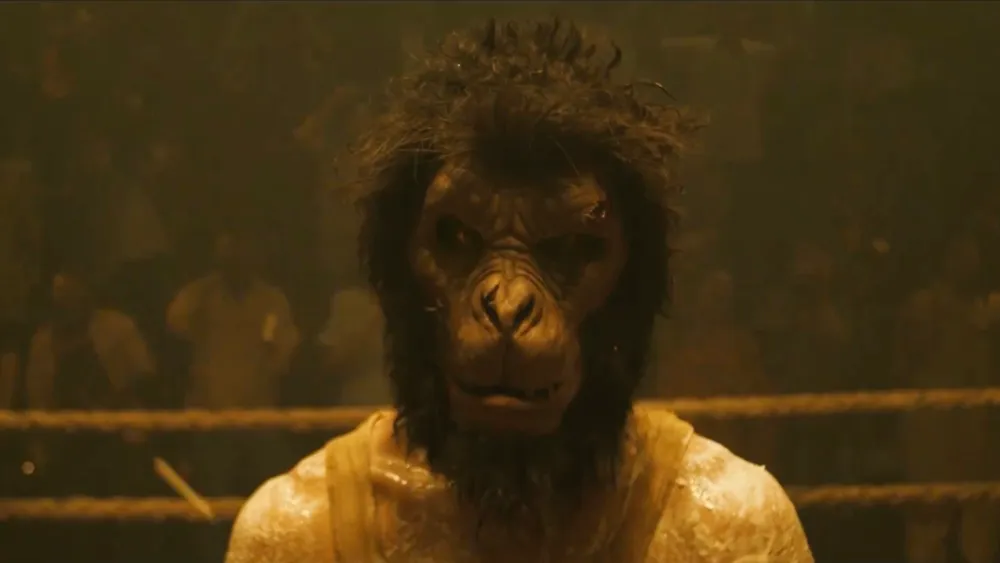Monkey Man could be one of the nicest surprises of the year. An epic action journey through the demimonde of Mumbai, it’s remarkably assured work from Dev Patel both behind the camera in his directorial debut, and as a believably rugged hero. Its beats are familiar, but the class (and caste) conscious action, that takes us from the lowliest slums to the most glittering penthouses has a multiplicity of flavours that sets it apart.
Patel is an anonymous young man known only as ‘The Kid’. who earns cash brawling in a monkey mask on the illegal fight circuit. The mask is a nod to the monkey god Hanuman, the legends of which the Kid was told on the knee of his beloved mother. The Kid is planning on crawling his way out of the gutter to avenge her death at the hands of city’s ultra-corrupt elites, specifically police chief Rana Singh (Sikandar Kher). She was collateral damage in the political machinations of the powerful Baba Shakti (Makrand Deshpande), and The Kid begins to use his connections among the low-level workers in the corridors of power to begin to slither up the greasy pole.
Patel brings his undeniable acting talent to the action flick, adding some considerable emotional depth that is often lacking in the genre. He takes the time to steep the viewer in the Kid’s world before the carnage is unleashed. And what carnage it is. Monkey Man has the feel of that particularly Korean strain of the revenge drama, such as Oldboy and The Man from Nowhere, and the action style of the brutal Indonesian brilliance of The Raid and The Night Comes for Us. The fights are fluid and frenetic, chaotic but coherent, and every bit as full-bodied as its East Asian cousins.
Its individuality comes in the its thematic use of Hindu mythology, and the all-encompassing of portrayal of Mumbai in all of its richness and squalor. There are hundreds of Indian action films released every year, but the simple decision to take its cues from the East rather than the West instantly sets it apart. Within that wider canvas there are moments of bizarre specificity like a furiously mugging Sharlto Copley as the fight club’s MC, a training montage backed by some furious tabla drumming, a pimped-out tuk tuk, and a band of machete-wielding transgender Dalits. It all helps Monkey Man feel genuinely fresh and exciting.
It still hits the odd stumbling block; the odd moment where it shows Patel is still finding his feet as a filmmaker. It relies a little heavily on flashback, suggesting perhaps a lack of confidence in setting up the emotional resonance more organically. Secondly, most of the chief antagonists are a little uninspired. Chief of police Rana and club owner/ people trafficker Queenie (Ashwini Kalsekar) are fairly generic and get lost in the melee. Literal political guru Baba Shakti is more interesting. He doesn’t get much screen time, but his fingerprints are shown to be all over the city, moulding it in his own image. He looms large on TVs and digital billboards, a symbolic link between the spiritual world and the secular, personifying the corruption of both.
Perhaps its because its made by an outsider exploring his heritage, but Monkey Man feels like the pointed critique of the Modi era that too rarely comes from the cinema of the subcontinent. There’s a palpable sense of purpose that shines through, even amidst the broken bones and the flambéed heads (yes, really). It’s strange that it seemed destined for streaming until Jordan Peele stepped forward to help produce. That would have been a huge loss, as Monkey Man is one of the finest popcorn experiences you could wish for. It’s stylish, exciting, memorable, and actually has something to say. Dev Patel: Action hero. Action director. Who saw that coming?
In cinemas nationwide from Fri 5 Apr 2024


Comments